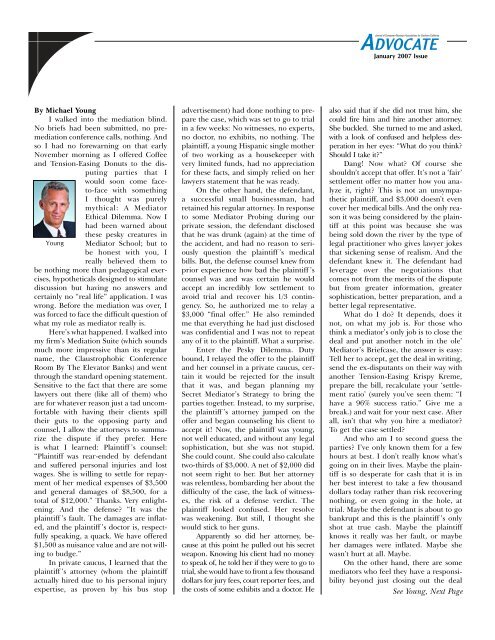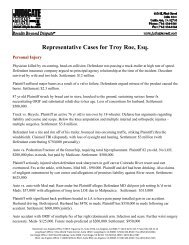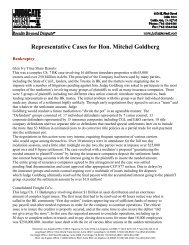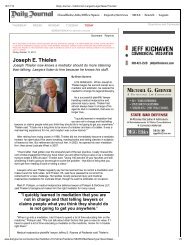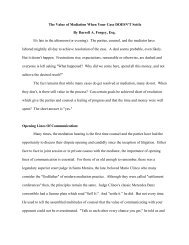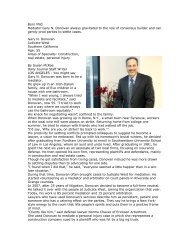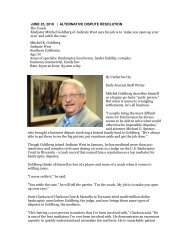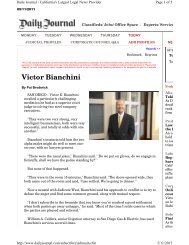Mediator madness - Judicate West
Mediator madness - Judicate West
Mediator madness - Judicate West
Create successful ePaper yourself
Turn your PDF publications into a flip-book with our unique Google optimized e-Paper software.
January 2007 Issue<br />
By Michael Young<br />
I walked into the mediation blind.<br />
No briefs had been submitted, no premediation<br />
conference calls, nothing. And<br />
so I had no forewarning on that early<br />
November morning as I offered Coffee<br />
and Tension-Easing Donuts to the disputing<br />
parties that I<br />
would soon come faceto-face<br />
with something<br />
I thought was purely<br />
mythical: A <strong>Mediator</strong><br />
Ethical Dilemma. Now I<br />
had been warned about<br />
Young<br />
these pesky creatures in<br />
<strong>Mediator</strong> School; but to<br />
be honest with you, I<br />
really believed them to<br />
be nothing more than pedagogical exercises,<br />
hypotheticals designed to stimulate<br />
discussion but having no answers and<br />
certainly no “real life” application. I was<br />
wrong. Before the mediation was over, I<br />
was forced to face the difficult question of<br />
what my role as mediator really is.<br />
Here’s what happened. I walked into<br />
my firm’s Mediation Suite (which sounds<br />
much more impressive than its regular<br />
name, the Claustrophobic Conference<br />
Room By The Elevator Banks) and went<br />
through the standard opening statement.<br />
Sensitive to the fact that there are some<br />
lawyers out there (like all of them) who<br />
are for whatever reason just a tad uncomfortable<br />
with having their clients spill<br />
their guts to the opposing party and<br />
counsel, I allow the attorneys to summarize<br />
the dispute if they prefer. Here<br />
is what I learned: Plaintiff ’s counsel:<br />
“Plaintiff was rear-ended by defendant<br />
and suffered personal injuries and lost<br />
wages. She is willing to settle for repayment<br />
of her medical expenses of $3,500<br />
and general damages of $8,500, for a<br />
total of $12,000.” Thanks. Very enlightening.<br />
And the defense? “It was the<br />
plaintiff ’s fault. The damages are inflated,<br />
and the plaintiff ’s doctor is, respectfully<br />
speaking, a quack. We have offered<br />
$1,500 as nuisance value and are not willing<br />
to budge.”<br />
In private caucus, I learned that the<br />
plaintiff ’s attorney (whom the plaintiff<br />
actually hired due to his personal injury<br />
expertise, as proven by his bus stop<br />
advertisement) had done nothing to prepare<br />
the case, which was set to go to trial<br />
in a few weeks: No witnesses, no experts,<br />
no doctor, no exhibits, no nothing. The<br />
plaintiff, a young Hispanic single mother<br />
of two working as a housekeeper with<br />
very limited funds, had no appreciation<br />
for these facts, and simply relied on her<br />
lawyers statement that he was ready.<br />
On the other hand, the defendant,<br />
a successful small businessman, had<br />
retained his regular attorney. In response<br />
to some <strong>Mediator</strong> Probing during our<br />
private session, the defendant disclosed<br />
that he was drunk (again) at the time of<br />
the accident, and had no reason to seriously<br />
question the plaintiff ’s medical<br />
bills. But, the defense counsel knew from<br />
prior experience how bad the plaintiff ’s<br />
counsel was and was certain he would<br />
accept an incredibly low settlement to<br />
avoid trial and recover his 1/3 contingency.<br />
So, he authorized me to relay a<br />
$3,000 “final offer.” He also reminded<br />
me that everything he had just disclosed<br />
was confidential and I was not to repeat<br />
any of it to the plaintiff. What a surprise.<br />
Enter the Pesky Dilemma. Duty<br />
bound, I relayed the offer to the plaintiff<br />
and her counsel in a private caucus, certain<br />
it would be rejected for the insult<br />
that it was, and began planning my<br />
Secret <strong>Mediator</strong>’s Strategy to bring the<br />
parties together. Instead, to my surprise,<br />
the plaintiff ’s attorney jumped on the<br />
offer and began counseling his client to<br />
accept it! Now, the plaintiff was young,<br />
not well educated, and without any legal<br />
sophistication, but she was not stupid.<br />
She could count. She could also calculate<br />
two-thirds of $3,000. A net of $2,000 did<br />
not seem right to her. But her attorney<br />
was relentless, bombarding her about the<br />
difficulty of the case, the lack of witnesses,<br />
the risk of a defense verdict. The<br />
plaintiff looked confused. Her resolve<br />
was weakening. But still, I thought she<br />
would stick to her guns.<br />
Apparently so did her attorney, because<br />
at this point he pulled out his secret<br />
weapon. Knowing his client had no money<br />
to speak of, he told her if they were to go to<br />
trial, she would have to front a few thousand<br />
dollars for jury fees, court reporter fees, and<br />
the costs of some exhibits and a doctor. He<br />
also said that if she did not trust him, she<br />
could fire him and hire another attorney.<br />
She buckled. She turned to me and asked,<br />
with a look of confused and helpless desperation<br />
in her eyes: “What do you think?<br />
Should I take it?”<br />
Dang! Now what? Of course she<br />
shouldn’t accept that offer. It’s not a ‘fair’<br />
settlement offer no matter how you analyze<br />
it, right? This is not an unsympathetic<br />
plaintiff, and $3,000 doesn’t even<br />
cover her medical bills. And the only reason<br />
it was being considered by the plaintiff<br />
at this point was because she was<br />
being sold down the river by the type of<br />
legal practitioner who gives lawyer jokes<br />
that sickening sense of realism. And the<br />
defendant knew it. The defendant had<br />
leverage over the negotiations that<br />
comes not from the merits of the dispute<br />
but from greater information, greater<br />
sophistication, better preparation, and a<br />
better legal representative.<br />
What do I do? It depends, does it<br />
not, on what my job is. For those who<br />
think a mediator’s only job is to close the<br />
deal and put another notch in the ole’<br />
<strong>Mediator</strong>’s Briefcase, the answer is easy:<br />
Tell her to accept, get the deal in writing,<br />
send the ex-disputants on their way with<br />
another Tension-Easing Krispy Kreme,<br />
prepare the bill, recalculate your ‘settlement<br />
ratio’ (surely you’ve seen them: “I<br />
have a 96% success ratio.” Give me a<br />
break.) and wait for your next case. After<br />
all, isn’t that why you hire a mediator?<br />
To get the case settled?<br />
And who am I to second guess the<br />
parties? I’ve only known them for a few<br />
hours at best. I don’t really know what’s<br />
going on in their lives. Maybe the plaintiff<br />
is so desperate for cash that it is in<br />
her best interest to take a few thousand<br />
dollars today rather than risk recovering<br />
nothing, or even going in the hole, at<br />
trial. Maybe the defendant is about to go<br />
bankrupt and this is the plaintiff ’s only<br />
shot at true cash. Maybe the plaintiff<br />
knows it really was her fault, or maybe<br />
her damages were inflated. Maybe she<br />
wasn’t hurt at all. Maybe.<br />
On the other hand, there are some<br />
mediators who feel they have a responsibility<br />
beyond just closing out the deal<br />
See Young, Next Page


